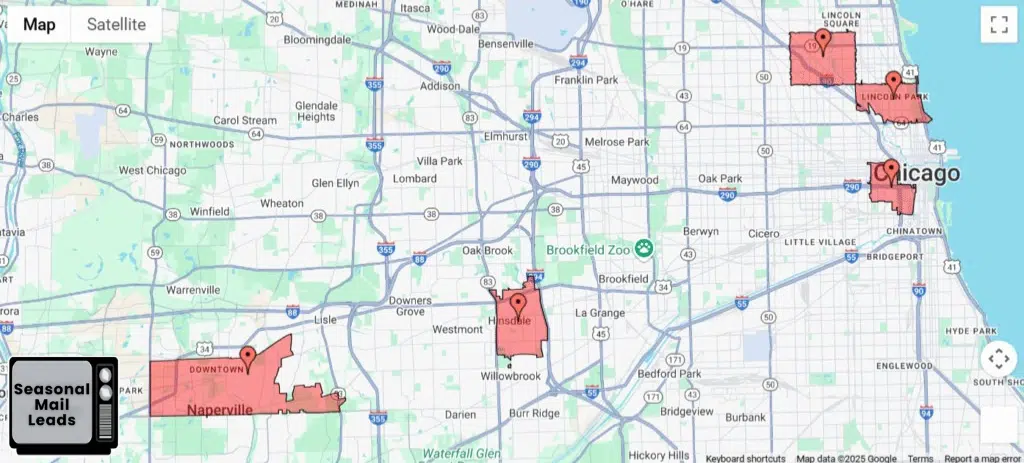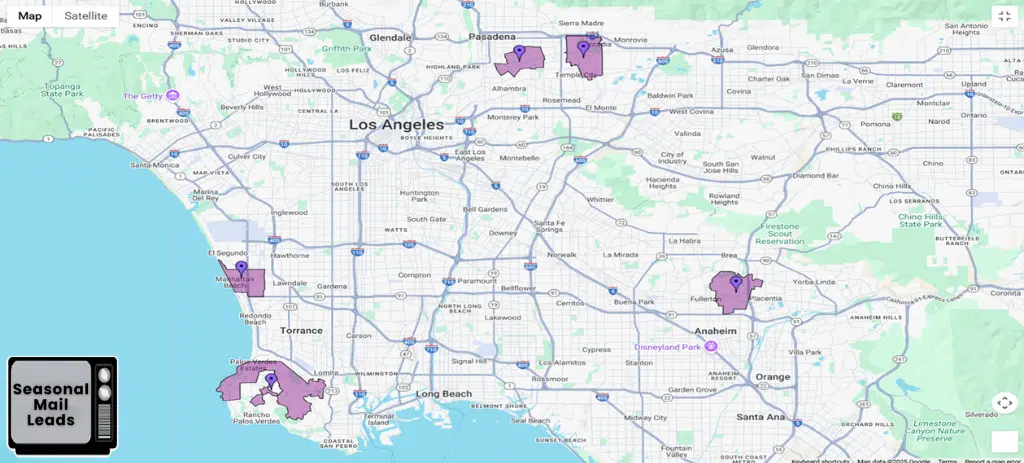
Direct Mail for Tax Law Leads:
Boosting Your Client Outreach
Direct Mail for Tax Law Leads:
Boosting Your Client Outreach
1. Introduction
The purchase of a new home is an ideal time to reach potential clients with tax law direct mail for new homeowners. Yet, beneath the surface of fresh paint and unpacked boxes, often lie intricate tax complexities and overlooked financial opportunities that can significantly impact a homeowner’s financial well-being. Is your firm strategically positioned to guide these new homeowners through these challenges, offering expert solutions that lead to lasting client relationships?
In a legal landscape increasingly saturated with digital noise, targeted direct mail offers an unparalleled advantage. It effectively reaches new homeowners precisely when they are most susceptible to a variety of tax-related legal needs, driving efficient client acquisition by directly addressing common concerns like property tax appeals, IRS issues, and capital gains. This article will delve into the specific tax law needs of new homeowners and demonstrate how Seasonal Mail Tax Law Leads can help your firm optimize its tax attorney mail campaigns for maximum impact and a robust pipeline of qualified clients.
2. Key Tax Law Needs for New Homeowners
The financial landscape shifts significantly with a new home purchase, creating numerous points where expert tax law guidance becomes not just beneficial, but essential. Attorneys who understand these specific needs can position their services effectively.
2.1. Property Tax Appeal Leads
Property taxes represent a substantial ongoing cost of homeownership, and for new homeowners, these taxes are often based on recent sales prices, which may not always reflect fair market value. This creates a frequent need for property assessment challenge leads.
- Understanding Property Assessments & Valuations: Many new homeowners are unfamiliar with how their property is assessed and valued by local authorities. They may receive a new assessment notice post-purchase and simply pay it, unaware that it could be over-assessed. An attorney specializing in tax law can educate them on the assessment process and the indicators of an unjust valuation. An over-assessed property directly translates to higher tax bills, making this a critical area of financial impact.
- Grounds for Appeal: Homeowners often lack knowledge of the legitimate grounds for appeal. These can include factual errors in the property record (e.g., incorrect square footage, number of bathrooms), unequal assessment compared to similar properties in the neighborhood, or a clear overvaluation of the property’s market value due to market fluctuations or recent distressed sales. Your firm can highlight these common scenarios to trigger recognition among homeowners.
- The Appeal Process & Deadlines: Navigating the property tax appeal process can be daunting, involving multiple stages from informal reviews to formal board hearings. Each step comes with strict deadlines that, if missed, can cost homeowners thousands. Attorneys can provide invaluable guidance, ensuring proper documentation, timely submissions, and effective representation, which is a powerful selling point in direct mail.
2.2. IRS Issues Client Acquisition
While buying a home often signifies financial stability, it can also bring existing or emerging IRS issues to the surface. A property transaction can sometimes trigger reviews or reveal prior tax debt or non-compliance.
- Tax Liens: An existing tax lien can complicate or even prevent a home purchase or sale. For new homeowners who might be dealing with a lien from a previous property or prior financial issues, a tax attorney is crucial for resolving these encumbrances.
- Outstanding Tax Debt: A new home purchase might lead to a closer examination of an individual’s financial standing by the IRS. This can expose previously unaddressed tax debt from prior years. Attorneys can offer solutions like Offer in Compromise (OIC), Installment Agreements, or penalty abatements.
- Audit Triggers: Certain property transactions, especially those involving significant capital gains from a prior sale or complex deductions, can sometimes increase the likelihood of an IRS audit. Proactive legal guidance can prepare homeowners or represent them during an audit, mitigating potential risks.
- Non-filing Issues: For some, the new financial obligations of a home might compel them to finally address years of unfiled tax returns, a situation where a tax attorney provides indispensable relief and compliance solutions.
2.3. Tax Compliance & Deductions (Mortgage Interest, Property Taxes)
For all new homeowners, understanding and maximizing their tax deductions is a key concern. While mortgage interest and property taxes are common deductions, the specifics can be complex, especially with varying state and local laws, and the caps introduced by recent tax reforms.
- Maximizing Deductions: Beyond the standard deductions, homeowners might be eligible for others, such as points paid on a mortgage, home office deductions (if applicable), or energy-efficient home credits. An attorney can ensure they are claiming every eligible deduction accurately.
- Compliance with Tax Laws: With significant assets like a home, ensuring full compliance with all federal, state, and local tax laws is critical. Misinterpretations or errors can lead to penalties. Attorneys provide the expertise needed for accurate reporting and peace of mind.
- Record Keeping: Guidance on proper record-keeping for home-related expenses (improvements, repairs, property taxes, mortgage interest statements) is invaluable for future tax filings and potential audits.
2.4. Capital Gains Tax Planning Advertising (for Future Sale)
For many new homeowners, their new property isn’t just a residence; it’s a significant investment. For those who sold a previous property to finance their new home, understanding capital gains tax implications is immediate. For others, proactive capital gains tax planning for a future sale becomes a crucial part of their long-term financial strategy.
- Exclusions and Exemptions: Advising on the primary residence capital gains exclusion (up to $250,000 for single filers, $500,000 for married couples) is fundamental. Attorneys can explain the ownership and use tests required to qualify.
- Record Keeping for Basis: Guiding homeowners on tracking improvements and other costs that increase their tax basis, thereby reducing future taxable capital gains.
- Investment Property Considerations: If the new home is an investment property or will eventually become one, the tax implications for depreciation, rental income, and future sale are vastly different and require specialized legal advice.
- 1031 Exchanges: For sophisticated investors or those converting a primary residence to a rental, advising on 1031 like-kind exchanges can defer capital gains taxes, a high-value service for specific clients.
3. Targeting Specific Tax Law Sub-Niches via Direct Mail: Tax Compliance Marketing
Effective direct mail for tax law is built on the foundation of precision marketing. Instead of broad appeals, Seasonal Mail Leads leverages sophisticated data analytics to identify and target specific tax law sub-niches among new homeowners, ensuring your outreach is highly relevant and cost-effective.
3.1. Identifying Over-assessed Properties
One of the most direct and compelling reasons a homeowner might seek tax law assistance is a perceived over-assessment of their property value. We utilize advanced data techniques to pinpoint these opportunities:
- Public Records Analysis: By cross-referencing recent sales data of comparable properties with current assessment records, we can identify properties that appear to be assessed significantly higher than their market value.
- Assessment Roll Discrepancies: We look for inconsistencies or errors in public assessment rolls that could form the basis of an appeal.
- Neighborhood Trends: Understanding recent declines in property values in specific areas, not yet reflected in assessments, can highlight homeowners ripe for property tax appeals.
This allows your firm to send direct mail specifically to homeowners who are statistically more likely to benefit from a property tax appeal service, creating an immediate, tangible value proposition.
3.2. Recent Home Sale Data for Compliance/Planning Needs
The act of buying or selling a home generates a wealth of data that indicates specific tax law needs. Seasonal Mail Leads uses this information to trigger highly relevant campaigns:
- Recently Sold Homes (Seller Side): For homeowners who recently sold a property (especially if it wasn’t their primary residence, or if they exceeded the capital gains exclusion), they immediately face capital gains tax questions. Direct mail can offer proactive tax planning or compliance assistance for these individuals.
- Recently Purchased Homes (Buyer Side): New buyers need guidance on mortgage interest deductions, property tax deductions, and establishing a cost basis for future sales. Campaigns can address these immediate compliance and deduction maximization needs.
- Out-of-State Relocations: Homeowners moving across state lines may have complex residency and state tax implications that require expert legal advice.
By targeting based on these specific transaction types and timelines, your direct mail arrives when the tax implications are fresh in their minds, creating a sense of immediate relevance.
3.3. Income Levels & Financial Indicators
Refining tax attorney mail campaigns based on income levels and other financial indicators allows your firm to focus on homeowners with complex tax planning needs or the capacity for higher-value engagements.
- High Net Worth Homeowners: These individuals often have more intricate tax situations, including multiple properties, investments, or business income, necessitating advanced tax planning strategies beyond basic deductions.
- Mortgage Loan Amounts: Larger mortgage amounts can indicate higher property values and potentially more complex financial scenarios that warrant legal tax advice.
- Public Financial Data (where available and permissible): Using permissible public financial indicators can help segment audiences for wealth planning, IRS tax resolution, or capital gains planning for significant assets.
This allows for a truly precision marketing approach, ensuring your direct mail not only reaches new homeowners but the right new homeowners who align with your firm’s specific service offerings and client value.
4. Designing Action-Oriented Direct Mail for Tax Law Leads: Driving Response
Even the most precisely targeted direct mail won’t generate leads if its design and messaging fail to compel action. For tax law leads, the focus must be on tangible benefits, urgency, and clear calls to action.
4.1. Highlighting Potential Savings or Relief for IRS debt resolution clients
The primary motivator for most homeowners seeking tax law assistance is financial. Your direct mail messaging should prominently feature the tangible savings or relief your firm can provide.
- Quantifiable Benefits: Instead of just saying “lower your taxes,” use phrases like “Potentially Save Thousands on Your Property Taxes,” or “Reduce Your IRS Debt by Up To X%.”
- Pain Point Solutions: Address their concerns directly: “Struggling with a High Property Assessment?”, “Worried About Capital Gains from Your Recent Sale?”, “Need Help Resolving IRS Issues?”.
- Peace of Mind: Emphasize how your services alleviate stress and provide financial security. “Achieve Peace of Mind with Expert Tax Compliance.”
Focusing on the financial gain or burden removed makes your service immediately appealing and relevant.
4.2. Urgency & Deadline-Based Messaging
Many tax law needs are inherently time-sensitive, creating a natural sense of urgency that can be leveraged in direct mail campaigns.
- Tax Appeal Windows: Property tax appeal deadlines are strict and vary by jurisdiction. Your mail can highlight these “limited time windows” to encourage immediate action. “Don’t Miss Your Chance to Appeal Your Property Tax Assessment – Deadline Approaching!”
- IRS Deadlines: For IRS issues like responding to notices or submitting an Offer in Compromise, specific deadlines exist. Messaging can underscore the importance of acting before penalties accrue.
- Year-End Tax Planning: For proactive capital gains planning or deduction maximization, approaching year-end can be a strong motivator for a consultation.
This kind of messaging creates a clear reason for the homeowner to respond now, rather than putting it off.
Clear, Benefit-Driven Offers
Your call to action (CTA) should be simple, compelling, and offer a clear benefit. For tax law leads, low-risk, high-value offers work best.
- Free Assessment Review: Offer to review their property assessment for free to determine if they have grounds for appeal. This is a low-commitment, high-value offer.
- Initial Consultation: Promote a “Complimentary Tax Strategy Session” to discuss their specific tax concerns related to their new home.
- Downloadable Guide: “A New Homeowner’s Guide to Tax Deductions” or “Understanding Capital Gains After Selling Your Home.” This educates prospects and captures their contact information.
- Webinar Invitation: Host an online seminar on “Tax Planning for New Homeowners” or “Navigating Property Tax Appeals.”
Ensure your CTA is prominent, easy to understand, and provides clear instructions on how to respond (e.g., a specific phone number, a dedicated website URL, or a QR code). The easier it is to act, the higher your response rates will be.
5. Tracking ROI in Tax Law Direct Mail Campaigns
The ability to accurately measure the return on investment (ROI) is crucial for any marketing strategy. With Seasonal Mail Leads, your tax law direct mail campaigns are designed for transparent and actionable tracking.
5.1. Monitoring Inquiries for Tax Issues
The first step in tracking ROI is to monitor the volume and nature of inquiries generated directly by your direct mail campaigns. This involves:
- Dedicated Phone Numbers: Assigning unique, trackable phone numbers to each direct mail campaign allows you to precisely attribute inbound calls to your mail efforts.
- Unique Landing Pages/URLs: Directing mail recipients to specific web pages or URLs (perhaps with a unique parameter) enables tracking of website traffic originating from the mail.
- QR Codes: Including QR codes on mailers makes it easy for smartphone users to quickly access specific content or forms, and these can be uniquely tracked.
- CRM Integration: Seamlessly integrate inquiry data into your Customer Relationship Management (CRM) system to log every lead and their source.
This granular tracking provides real-time data on which mail pieces, offers, and target segments are generating the most interest.
5.2. Client Acquisition for Ongoing Tax Planning/Dispute Cases
Beyond inquiries, the true measure is how many of these leads convert into retained clients. This requires tracking the entire sales funnel:
- Lead-to-Consultation Rate: How many inquiries result in a scheduled meeting?
- Consultation-to-Retainer Rate: What percentage of initial consultations convert into paying clients for property tax appeals, IRS issues, or tax planning?
- Average Case Value (ACV): Understanding the typical revenue generated per client acquired through direct mail for different tax law services.
By analyzing these conversion metrics, your firm can identify bottlenecks in the intake process, refine its sales pitch, and better allocate resources to maximize client acquisition from direct mail leads.
5.3. Case Study/Example
Consider “North Star Tax Law,” a firm specializing in property tax appeals. They partnered with Seasonal Mail Leads to target new homeowners in their county who had recently purchased homes where the assessment was statistically 15% or more above the recent sales price.
Seasonal Mail Leads crafted a direct mail campaign featuring a compelling headline: “Is Your New Home Over-Assessed? You Could Be Paying Too Much in Property Taxes!” The mailer offered a “FREE Property Assessment Review” via a unique phone number and QR code.
Within three months, North Star Tax Law received over 200 qualified inquiries, a 3.5% response rate. From these, they scheduled 120 consultations, converting 40 of them into retained clients for property tax appeals. With an average client saving of $2,500 annually and a contingency fee structure, this campaign delivered a measurable ROI of over 300% in the first year alone, with the potential for ongoing referrals. This demonstrates the clear financial returns achievable with a strategically executed tax law direct mail campaign.
5.4. Pricing & Campaign Options
Get started with targeted direct mail campaigns to new homeowners. Our pricing includes:
- Professionally Designed Postcard: One custom 6″ x 11″ postcard with two revisions.
- Targeted Mailing List Options: Reach the homeowners most relevant to your practice area.
- Comprehensive Campaign Management: We handle design, printing, and delivery.
Simple & Flexible Plans:
For a 10-week campaign sending 1,000 postcards (100 per week), consider these options:
- New Client Plan (16 Weeks): Just $103.99 every week (total 16 weeks), for a total of $1,663.84. Includes your custom postcard design.
- Returning Client 4-Month Renewal (16 Weeks): Only $83.99 every week (total 16 weeks), for a total of $1,343.84. Reuses your existing postcard design.
Ready to grow your firm? Start your campaign today and connect with new potential clients.
6. Getting Started with New Homeowner Tax Needs
The market of new homeowners is a constantly refreshing source of individuals facing diverse and often complex tax law needs. By embracing a targeted direct mail strategy powered by Seasonal Mail Leads, your firm can proactively tap into this lucrative demographic, acquiring exclusive leads that convert into robust, long-term client relationships.
Consider the compounding potential for your firm:
- Clients seeking property tax appeals who then rely on your firm for future tax planning.
- Homeowners with IRS issues who become loyal clients for all their subsequent tax compliance needs.
- Satisfied clients who refer their networks, generating new business through trusted recommendations.
This is more than just transactional lead generation; it’s about building a sustainable pipeline of high-value clients who view your firm as their trusted legal partner for all their property and tax-related legal needs.
Don’t let the opportunity to serve these highly motivated new homeowners pass by. Don’t wait for them to search blindly amidst the digital noise. Reach out to them directly, personally, and at the precise moment they need your expertise.
6.1. Call to Action:
Ready to generate qualified Tax Law leads from new homeowners?
- Request Your FREE Sample Postcard specifically crafted for Tax Law.
- Get a Quote for targeted Property Tax Appeal leads and other tax-related services.
Let Seasonal Mail Leads help you write the next chapter of your firm’s success story.
7. Conclusion
The acquisition of a new home is a significant life event that invariably brings with it specific and often overlooked tax law needs. While digital marketing channels have their merits, direct mail stands out as an incredibly effective and strategic channel for capturing the attention and business of new homeowners seeking guidance on IRS issues, property tax appeals, and comprehensive tax compliance.
Seasonal Mail Leads specializes in optimizing and targeting tax law lead generation, helping your firm attract clients who are ready to resolve their financial and property tax concerns. By leveraging sophisticated data to identify specific sub-niches, crafting compelling messages focused on savings and relief, and providing robust ROI tracking, Seasonal Mail Leads transforms your outreach into a powerful client acquisition engine.
It’s time to move beyond the traditional. Embrace the ultimate playbook. Discover how targeted direct mail, powered by Seasonal Mail Leads, can consistently deliver the exclusive legal leads your firm needs to thrive and become the trusted legal partner for every new homeowner navigating the complexities of their property’s financial and tax-related legal landscape.






